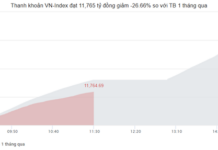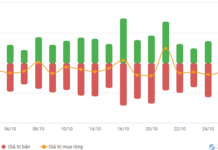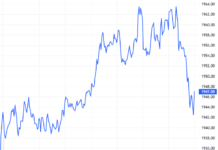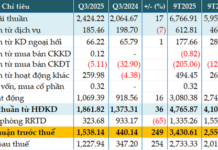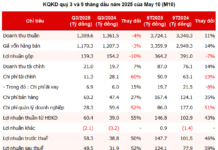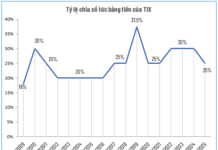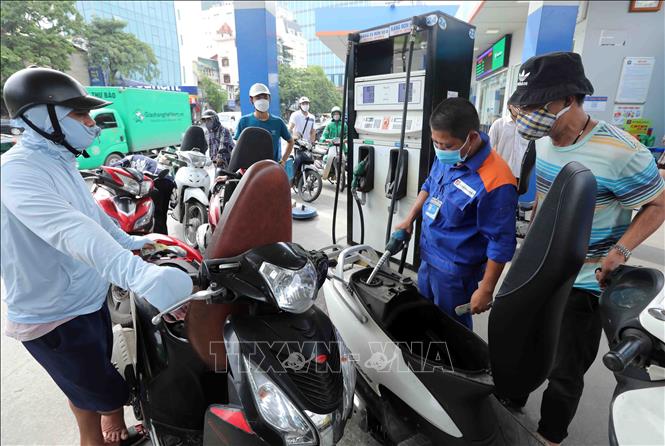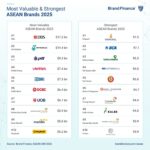To keep or to abolish? The debate on Vietnam’s gasoline price stabilization fund
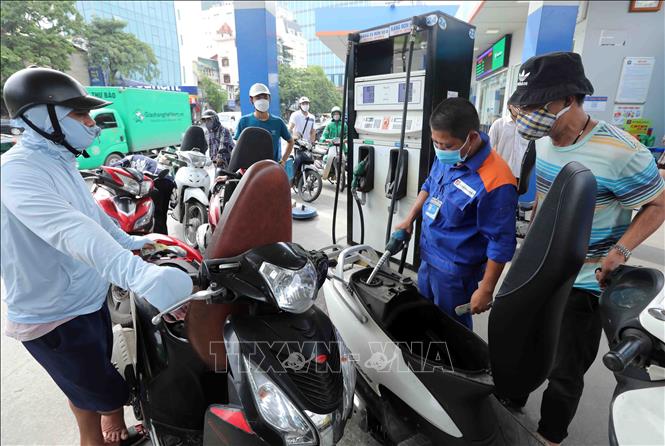
A customer purchases gasoline at a gas station in Hanoi, Vietnam. Illustrative image. (Photo: Tran Viet/ VNA)
According to Mr. Bui Ngoc Bao, Chairman of the Vietnam Petroleum Association (VINPA), each gasoline and oil trading enterprise is required by law to open a separate account to monitor the amount of money spent and deducted from the gasoline and oil price stabilization fund as announced by the Ministry of Industry and Trade in each period of gasoline and oil price management. The enterprise is responsible before the law for the management of the fund and reports to the Ministry of Industry and Trade and the Ministry of Finance. If there is no decision to spend the fund as directed by the two ministries, in reality, the fund is only deposited in the bank and does not affect the market.
As a result, some enterprises make the correct and timely accounting transfer, while others do not, but generally, the total amount of money transferred “cannot be ambiguous” because there is a stage of post-inspection and supervision by the management agency. Therefore, enterprises that do not transfer or owe the fund violate the regulations. In reality, during the years of the COVID-19 pandemic, many gasoline and oil trading enterprises suffered losses because the selling price at some points was lower than the production cost, so they could not transfer the price stabilization fund and fell into a state of debt to the fund.
A trading enterprise also said that in 2022, the enterprise had to borrow from the bank to transfer enough when there was a decision to spend from the two ministries. Therefore, the enterprise’s gasoline and oil business in 2022 became even more difficult in the context that the enterprise had to import reserves as directed at the time of high prices at the beginning of the year, but when selling later, it followed the market price at the time of low prices.
According to Mr. Bao, the gasoline and oil price stabilization fund in previous years was a tool of the Government to ensure that gasoline and oil prices did not increase sharply in the context of strong fluctuations in the world market. However, at this time, the fluctuation range of oil prices compared to the time of the establishment of the gasoline and oil price stabilization fund before the promulgation of the 2012 Law on Prices is quite different in terms of prices and product structure, so it is no longer purely proportional, and the difference is too large. Therefore, in reality, the fund can only compensate for a part and is inconsistent with the time of its formation. Therefore, the management agency should consider abolishing this fund, said the Chairman of VINPA.
Similarly, economic expert Vu Vinh Phu (former Deputy Director of Hanoi Department of Industry and Trade) also emphasized in many discussions with the press that the Decision on the establishment of the gasoline and oil price stabilization fund stipulates that the fund “is effective in the period of 2012-2016”. But up to now, the gasoline and oil price stabilization fund still exists.
Meanwhile, there were times during the management period (June 13, 20, and 27), gasoline and oil prices increased sharply, specifically E5 RON92 increased by about VND 880/liter within 3 weeks; RON95 gasoline price increased by about VND 1,040/liter within 3 weeks and diesel oil price increased by about VND 1,270/liter within 3 weeks, but the two ministries did not deduct the stabilization fund.
In reality, from October 2023 to the adjustment period on August 8, 2024, the two ministries did not deduct or spend the gasoline and oil price stabilization fund, while at the end of 2023, the fund still had nearly VND 7,000 billion. The stabilization fund is to stabilize gasoline and oil prices, but in reality, the fund is “inactive”, so its existence needs to be reconsidered, said Mr. Vu Vinh Phu.
In the latest draft Decree on gasoline and oil business recently completed and sent to the Ministry of Justice for verification by the Ministry of Industry and Trade, it is mentioned that, in the past time, during the inspection and examination process, specialized agencies of the Party and the Government have opinions that the deduction and use of the fund according to the long-term regulations are not suitable for the Law on Prices.
Also according to the Ministry of Industry and Trade, with the implementation of the price adjustment cycle of 7 days/time as currently, the price fluctuation between the two adjustments is basically not large, so the impact of gasoline and oil price adjustment on the socio-economic situation is not large, and the gasoline and oil price stabilization fund is rarely used to stabilize gasoline and oil prices.
Establishing a new stabilization tool
Mr. Bui Ngoc Bao said that if we still want to maintain the gasoline and oil price stabilization fund, we should transfer this fund to the State management, not to the enterprises as currently. Accordingly, it is necessary to establish a mechanism to form a fund contributed to the State as a tax and change the way of using it; in which this fund should focus on the national gasoline and oil reserve so that when there is a need to stabilize the price, the national reserve will be sold to the market.
In reality, in developed countries, the national gasoline and oil reserve often ranges from 3 to 6 months, even 9 months. When the world gasoline and oil prices are high, they will be sold or used to stabilize the market, and when the world prices are low, they will be bought for reserves to operate effectively.
Besides, price stabilization can also be implemented through tax and fee policies or gasoline and oil price insurance, while the rest is left to the market to operate. Only in this way can the gasoline and oil supply always be guaranteed, and the prices will be competitive among enterprises, thereby bringing benefits to consumers, said Mr. Bui Ngoc Bao.
The Government is also directing the study of reflecting the proposal on the establishment of a Gasoline and Oil Exchange to increase transparency and overcome the instability of the gasoline and oil market, thereby having solutions to deploy in accordance with its competence and the provisions of the law. Operating a Gasoline and Oil Exchange will publicly announce information about prices and trading volume, thereby minimizing price manipulation, creating a flexible pricing mechanism, and improving the distribution and circulation of gasoline and oil.
On July 30, 2024, the Ministry of Industry and Trade (Domestic Market Department) held a workshop to discuss the establishment of a Gasoline and Oil Exchange. The Ministry of Industry and Trade also affirmed that it would continue to listen to the opinions of associations, enterprises, and experts on the establishment of a Gasoline and Oil Exchange in Vietnam to build a suitable model for Vietnam.
The most extensive bribery case ever in Thanh Hoa: Numerous suspects prosecuted for “Giving and Receiving Bribes”
The Provincial Security Investigation Agency (PSIA) of Thanh Hoa province announced on January 31st that it has made the decision to initiate a prosecution against 23 individuals in connection with the offenses of “Accepting bribes” and “Giving bribes” as stipulated in Article 354(3) and Article 364(2) of the Criminal Code.
Vietnam’s Irresistible ‘Specialty’ That China Desperately Wants to Revive: Highly Popular from the US to Asia, Bringing in Millions of Dollars
Vietnam is one of the largest exporting countries in the world, along with China and the Philippines.

